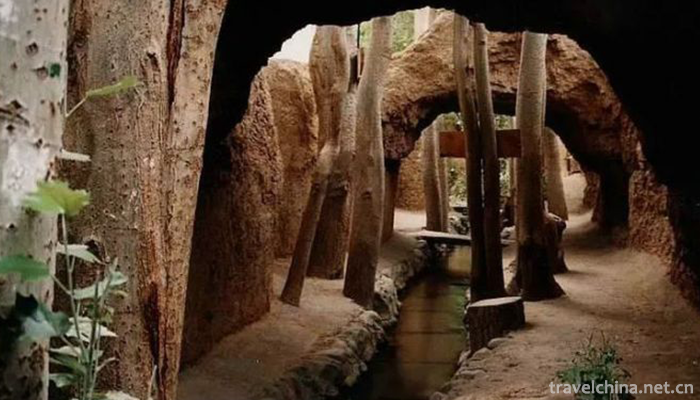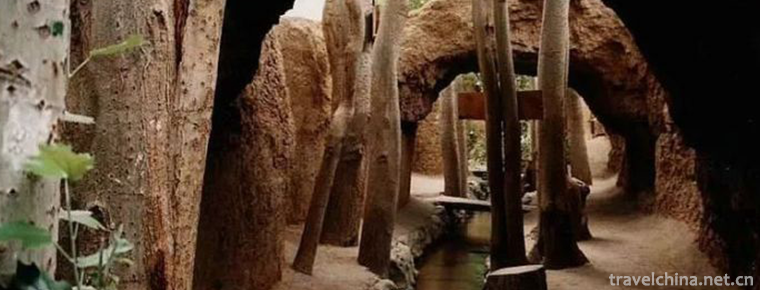Cutting Skill of Kaner Well
Cutting Skill of Kaner Well
Kanerjing is the meaning of "well hole". It has been recorded as early as in Historical Records. It is called "well canal", while Xinjiang Uygur language is called "Kanerzi". Kanerjing is a special irrigation system in desert areas, which is widely used in Turpan, Xinjiang, China. Kanerjing, together with the Great Wall and the Grand Canal of Beijing and Hangzhou, is known as the three major projects in ancient China. The total number of Kaner wells in Turpan is more than 1100, with a total length of about 5000 kilometers. On November 11, 2014, the drilling technique of Kanerjing was approved by the State Council and listed in the fourth batch of representative projects of national intangible cultural heritage.
brief introduction
Kanerjing, which means "well hole", is called "Kanerzi" in Xinjiang Uygur language. Kanerjing is a special irrigation system with ingenious structure in desert areas, especially in Turpan, Xinjiang. It is called the Three Great Projects of Ancient China with the Great Wall and the Grand Canal of Beijing and Hangzhou. The total number of Kaner wells in Turpan is more than 1100, with a total length of about 5000 kilometers.
2. Structural Principle
Kaner well is an ancient horizontal catchment structure for groundwater development and utilization. It is suitable for foothills and alluvial fan margins, mainly for intercepting underground diving for farmland irrigation and residential water use.
The structure of Kaner well is composed of four parts: vertical shaft, underground channel, surface channel and "waterlogging dam" (small reservoir). Bogda Mountain in the north of Turpan Basin and Karawucheng Mountain in the West are covered with snow and rainwater in spring and summer, which dive into the Gobi beach. By using the slope of the hill, people ingeniously created Kaner wells to divert underground subsurface flow to irrigate farmland. Kaner well does not evaporate a lot of water because of hot and strong wind, so the flow rate is stable and self-flow irrigation is guaranteed.
3 role
The reason why Kanerjing was built in large numbers in Turpan Basin is inseparable from the local physical and geographical conditions. Turpan is one of the extremely arid areas in China, with annual precipitation of only 16 mm and evaporation of up to 3000 mm, which can be called the "dry pole" of China. However, Kaner well is an underground underground canal water conveyance, not affected by season, wind and sand, small evaporation, stable flow, can be perennial self-flow irrigation.
It is precisely because of this unique underground water conservancy project, which leads the underground water to the ground and irrigates hundreds of thousands of mu of good fields in the basin, that the Turpan people of all nationalities were bred and the desert became an oasis.
On November 11, 2014, the drilling technique of Kanerjing was approved by the State Council and listed in the fourth batch of representative projects of national intangible cultural heritage.


-
1.Mount Wuyi
Wuyi Mountain, Wuyi Mountain is located at the junction of Jiangxi and northwest Fujian Province. The southeastern foot of Wuyi Mountain has a total area of 999.75 square kilometers. It is a famous sc
Time 2018-10-28 -
2.Huanghelou Park Wuhan
Wuhan Yellow Crane Tower Park: The Yellow Crane Tower on Snake Mountain in Wuchang is one of the three famous buildings in the south of the Yangtze River.
Time 2018-12-12 -
3.Oriental Giant Turtle Garden
Located on the East Bank of Yehe River in Pingshan County, Hebei Province, the Oriental Giant Turtle Garden is near Xibaipo, a sacred revolutionary site, 35 kilometers east of Shijiazhuang
Time 2018-12-20 -
4.Yuexiu Park Guangzhou
Yuexiu Park is the largest comprehensive park in Guangzhou. The main body of Yuexiu Park is Yuexiu Mountain. In the Western Han Dynasty, Zhao Tuo, the king of South Vietnam, was named after the "
Time 2019-01-13 -
5.Hailongtun Site
Hailongtun is located on the top of Longyan Mountain, about 28 kilometers northwest of Zunyi City, Guizhou Province. It is also called Hailongdun, Longyantun and Longyantun.
Time 2019-01-13 -
6.Tanxi Mountain Scenic Area
Tanxi Mountain Tourist Area: National AAAA Tourist Area, National Forest Park, National Geopark, National Water Conservancy Scenic Area and Key Scenic Spots in Shandong Province.
Time 2019-02-13 -
7.Zhaohua Ancient City Scenic Area
The ancient city of Zhaohua has a long history and rich humanities in Zhaohua Town, Zhaohua District, Guangyuan City, Sichuan Province. The original name of Yichang County was changed to Zhaohua Count
Time 2019-03-17 -
8.Tea Picking Opera
Tea-picking opera is a kind of traditional opera popular in Jiangnan and Lingnan provinces. It was mostly produced from the middle of Qing Dynasty to the end of Qing Dynasty.
Time 2019-04-04 -
9.Dabie Mountain Folk Songs
Dabie Mountain folk song is a traditional folk song widely circulated in the west of Anhui Province. With the unique regionality of the interdependence of mountains and rivers
Time 2019-04-23 -
10.Longyan tea lamp
Longyan tea-picking lamp, also known as tea-picking and butterfly-beating, is a popular folk dance and singing in Longyan city and countryside. It integrates rap, opera and dance into a comprehensive
Time 2019-05-14 -
11.Uygur Embroidery
Embroidery is one of the most representative decorative techniques in Uygur costumes in China. Whether it is Uygur clothes, skirts, shoes, hats and beds, the interior decorative articles adorn the exq
Time 2019-06-26 -
12.Silk Bamboo in Yichang
Yichang silk bamboo, also known as "fine music", is the representative genre of folk instrumental music art in Yichang. It is mainly popular in Yaqueling and Longquan of Yiling District, and
Time 2019-07-12